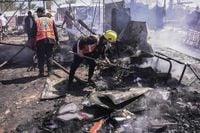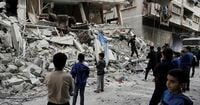An Israeli airstrike has flattened a three-storey home in Gaza City, killing 10 people—half of them children—as Arab mediators scramble to restart a ceasefire. The early morning attack, which occurred on April 26, 2025, is part of a broader escalation in violence that has seen Israeli strikes kill at least 49 individuals in the past 24 hours, according to health officials.
The airstrike targeted a neighborhood in western Gaza City, resulting in the deaths of three women and five children, according to Shifa Hospital, which received the bodies. Israel’s military claimed that the strike was aimed at a Hamas militant, asserting that the structure housing him collapsed as a result of the operation. However, they noted that the circumstances surrounding the collapse are still under review.
“There is no one from the resistance among them,” lamented Saed Al-Khour, who lost family members in the strike. “Since 1 o’clock until now we have been pulling out the remains of children, women, and elderly people.” His words echo the sentiments of many grieving families amid the destruction.
In addition to the casualties from the airstrike, three other individuals were killed in the Shati refugee camp along Gaza City’s shoreline. This latest wave of violence comes as Hamas announced that it had dispatched a high-level delegation to Cairo, aiming to negotiate a return to the ceasefire that was shattered last month due to Israeli bombardments.
Israeli officials have vowed to continue their military operations until all hostages are returned and Hamas is either destroyed or disarmed. Furthermore, they have stated intentions to hold parts of Gaza indefinitely and implement U.S. President Donald Trump’s controversial proposal for the resettlement of the Palestinian population, a plan that has faced widespread international rejection.
Hamas has indicated that it will only release the hostages it holds in exchange for Palestinian prisoners, a complete Israeli withdrawal, and a lasting ceasefire, as outlined in a now-defunct agreement from January. As part of the ongoing negotiations, Hamas officials arrived in Cairo earlier this week to discuss a proposal that would involve a five-to-seven year truce along with the release of all remaining hostages.
Egypt and Qatar are reportedly working together on this proposal, which would include a gradual withdrawal of Israeli forces from Gaza and the release of Palestinian prisoners. Meanwhile, the humanitarian situation in Gaza continues to deteriorate. Israel has maintained a blockade for nearly two months, leading to severe shortages of essential supplies.
On April 25, 2025, the World Food Programme announced that its food stocks in Gaza had completely run out, cutting off a vital source of sustenance for hundreds of thousands of Palestinians. The agency warned that the charity kitchens it supports, which provide food to about 80% of Gaza’s population of over two million, are expected to run out of food within days.
“Meanwhile, nearly 3,000 UNRWA trucks of lifesaving aid are ready to enter Gaza,” the UN agency for Palestinian refugees stated on social media, emphasizing the urgent need for the siege to end. The humanitarian crisis is exacerbated by the ongoing violence, with hospitals overwhelmed by the number of casualties.
According to Gaza’s health ministry, Israel’s offensive has resulted in the deaths of more than 51,000 Palestinians, predominantly women and children. The ministry does not specify how many of those killed were militants or civilians, while Israel claims to have killed around 20,000 militants, although no evidence has been provided to substantiate this figure.
The current conflict erupted when Hamas-led militants launched an attack on southern Israel on October 7, 2023, resulting in approximately 1,200 deaths, mostly among civilians, and the abduction of 251 individuals. As of now, the militants are believed to still hold 59 hostages, with 24 of them thought to be alive.
In a related development, violence has also flared in northern Gaza, where an IDF officer and an Israel border police officer were killed in combat. Reports indicate that Hamas is willing to release all hostages in exchange for a five-year ceasefire, a proposal that could potentially shift the dynamics of the ongoing negotiations.
As the situation remains fluid, the international community watches closely, hoping for a resolution that can bring an end to the suffering of those caught in the conflict. The humanitarian needs are dire, and the prospect of peace hangs precariously in the balance.





